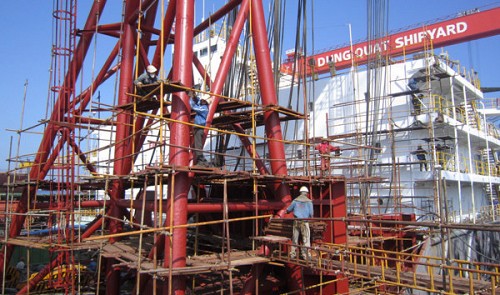A peek into the workings of numerous subsidiaries and affiliates under the umbrella of PetroVietnam, the country’s oil and gas giant, is quick to reveal more than a few operations running at a deficit.
The latest PetroVietnam subsidiary saddled with huge debts is the Dung Quat Shipyard (DQS), a shipbuilding company located in the central province of Quang Ngai.
In a recent report to the government, the Ministry of Industry and Trade, which manages PetroVietnam, identified DQS’s total debts at VND6.89 trillion (US$307.59 million) and its accumulated losses totaling nearly VND3.68 trillion ($164.29 million) as of the end of June.
By the end of the first half of this year, the company reported a negative equity of VND1.18 trillion ($52.68 million), according to the report.
DQS was initially a subsidiary of the Vinashin, a company that collapsed due to losses in 2011. In October 2013, Vinashin was ‘revitalized’ and renamed the Shipbuilding Industry Corporation (SBIC), with some of its subsidiaries, including the DQS, transferred to other state-run enterprises.
DQS officially came under PetroVietnam’s umbrella in July 2010, shortly before being tasked with several shipbuilding projects and eventually descending into extreme debt.
PetroVietnam attempted to rescue DQS by adding VND1.99 trillion ($88.84 million) to its equity, alongside a VND3.1 trillion ($138.39 million) credit package to help the shipbuilder repay its debts.
However, PetroVietnam’s efforts were in vain and the trade ministry is now seeking a government directive on how to “resolve those unsolvable problems at DQS,” according to the report.
The trade ministry also outlined three proposed solutions to handle the DQS crisis for the government’s consideration.
The first proposition is to continue restructuring efforts at DQS, while the second suggests returning the company to SBIC’s management. The last solution is to have DQS declare bankruptcy.
The trade ministry said it prefers the second solution, while admitting that, as a worst case scenario, a bankruptcy option may be chosen even though it may facilitate further financial damage.
Losses upon losses
DQS now joins PVC, the construction arm of PetroVietnam, in a lengthening list of loss-making units under the state-run oil and gas behemoth.
PVC incurred a VND3.3 trillion ($147.32 million) loss between 2011 and 2012 under the leadership of chairman Trinh Xuan Thanh and general director Vu Duc Thuan.
Thuan and three other former top PVC officials were taken into custody on charges of “intentionally violating state regulations on economic management that caused severe consequences” in September, while Thanh fled just before police announced his charges leading to an international wanted notice for his arrest.
In July, a financial report of PetroVietnam’s operations in 2014 showed that many of the company’s subsidiaries failed to operate at a gain.
According to the report, in 2014 PetroVietnam invested more than VND154 trillion ($6.88 billion) in 20 subsidiaries and another VND19 trillion ($848.21 million) in affiliates.
The long list of loss-making subsidiaries includes PVTex, the operator of an uneconomic US$325 million yarn mill, the Binh Son Refining and Petrochemical, which runs the country’s sole operational refinery Dung Quat, and of course, DQS and PVC.
PVTex posted accumulated losses of $1.47 trillion ($65.63 million) while Binh Son Refining and Petrochemical’s losses reached VND1.15 trillion ($51.34 million).
The ex-PVTex general director Vu Dinh Duy left Vietnam in October and is allegedly hiding overseas to avoid allegations of misdoings.























































